- Home
- D. H. Lawrence
Collected Short Stories Page 6
Collected Short Stories Read online
Page 6
"Tha's got it somewheer about thee," said Chris.
They made him take off his coat and waistcoat. Chris examined the coat, Sam the waistcoat, whilst Ephraim searched his trousers.
"Well," said Chris, "I'n foraged this coat, an' it's non theer."
"An' I'll back my life as th' on'y bit a metal on this wa'scoat is the buttons," said Sam.
"An' it's non in my breeches," said Ephraim. He took off his boots and his stockings. The half-sovereign was not there. He had not another coin in his possession.
"Well," said Chris, "we mun go back an' look for it."
Back they went, four serious-hearted colliers, and searched the field, but in vain.
"Well," said Chris, "we s'll ha'e ter share wi' thee, that's a'."
"I'm willin'," said John Wharmby.
"An' me," said Sam.
"Two bob each," said Chris.
Ephraim, who was in the depths of despair, shamefully accepted their six shillings.
In Bulwell they called in a small public-house, which had one long room with a brick floor, scrubbed benches and scrubbed tables. The central space was open. The place was full of colliers, who were drinking. There was a great deal of drinking during the strike, but not a vast amount drunk. Two men were playing skittles, and the rest were betting. The seconds sat on either side the skittle-board, holding caps of money, sixpences and coppers, the wagers of the "backers".
Sam, Chris, and John Wharmby immediately put money on the man who had their favour. In the end Sam declared himself willing to play against the victor. He was the Bestwood champion. Chris and John Wharmby backed him heavily, and even Ephraim the Unhappy ventured sixpence.
In the end, Sam had won half a crown, with which he promptly stood drinks and bread and cheese for his comrades. At half-past one they set off again.
It was a good match between Notts and Villa--no goals at half-time, two-none for Notts at the finish. The colliers were hugely delighted, especially as Flint, the forward for Notts, who was an Underwood man well known to the four comrades, did some handsome work, putting the two goals through.
Ephraim determined to go home as soon as the match was over. He knew John Wharmby would be playing the piano at the "Punch Bowl", and Sam, who had a good tenor voice, singing, while Chris cut in with witticisms, until evening. So he bade them farewell, as he must get home. They, finding him somewhat of a damper on their spirits, let him go.
He was the sadder for having witnessed an accident near the football-ground. A navvy, working at some drainage, carting an iron tip-tub of mud and emptying it, had got with his horse on to the deep deposit of ooze which was crusted over. The crust had broken, the man had gone under the horse, and it was some time before the people had realised he had vanished. When they found his feet sticking out, and hauled him forth, he was dead, stifled dead in the mud. The horse was at length hauled out, after having its neck nearly pulled from the socket.
Ephraim went home vaguely impressed with a sense of death, and loss, and strife. Death was loss greater than his own, the strike was a battle greater than that he would presently have to fight.
He arrived home at seven o'clock, just when it had fallen dark. He lived in Queen Street with his young wife, to whom he had been married two months, and with his mother-in-law, a widow of sixty-four. Maud was the last child remaining unmarried, the last of eleven.
Ephraim went up the entry. The light was burning in the kitchen. His mother-in-law was a big, erect woman, with wrinkled, loose face, and cold blue eyes. His wife was also large, with very vigorous fair hair, frizzy like unravelled rope. She had a quiet way of stepping, a certain cat-like stealth, in spite of her large build. She was five months pregnant.
"Might we ask wheer you've been to?" inquired Mrs. Marriott, very erect, very dangerous. She was only polite when she was very angry.
"I' bin ter th' match."
"Oh, indeed!" said the mother-in-law. "And why couldn't we be told as you thought of jaunting off?"
"I didna know mysen," he answered, sticking to his broad Derbyshire.
"I suppose it popped into your mind, an' so you darted off," said the mother-in-law dangerously.
"I didna. It wor Chris Smitheringale who exed me."
"An' did you take much invitin'?"
"I didna want ter goo."
"But wasn't there enough man beside your jacket to say no?"
He did not answer. Down at the bottom he hated her. But he was, to use his own words, all messed up with having lost his strike-pay and with knowing the man was dead. So he was more helpless before his mother-in-law, whom he feared. His wife neither looked at him nor spoke, but kept her head bowed. He knew she was with her mother.
"Our Maud's been waitin' for some money, to get a few things," said the mother-in-law.
In silence, he put five-and-sixpence on the table.
"Take that up, Maud," said the mother.
Maud did so.
"You'll want it for us board, shan't you?" she asked, furtively, of her mother.
"Might I ask if there's nothing you want to buy yourself, first?"
"No, there's nothink I want," answered the daughter.
Mrs. Marriott took the silver and counted it.
"And do you," said the mother-in-law, towering upon the shrinking son, but speaking slowly and statelily, "do you think I'm going to keep you and your wife for five and sixpence a week?"
"It's a' I've got," he answered sulkily.
"You've had a good jaunt, my sirs, if it's cost four and sixpence. You've started your game early, haven't you?"
He did not answer.
"It's a nice thing! Here's our Maud an' me been sitting since eleven o'clock this morning! Dinner waiting and cleared away, tea waiting and washed up; then in he comes crawling with five and sixpence. Five and sixpence for a man an' wife's board for a week, if you please!"
Still he did not say anything.
"You must think something of yourself, Ephraim Wharmby!" said his mother-in-law. "You must think something of yourself. You suppose, do you, I'm going to keep you an' your wife, while you make a holiday, off on the nines to Nottingham, drink an' women."
"I've neither had drink nor women, as you know right well," he said.
"I'm glad we know summat about you. For you're that close, anybody'd think we was foreigners to you. You're a pretty little jockey, aren't you? Oh, it's a gala time for you, the strike is. That's all men strike for, indeed. They enjoy themselves, they do that. Ripping and racing and drinking, from morn till night, my sirs!"
"Is there on'y tea for me?" he asked, in a temper.
"Hark at him! Hark-ye! Should I ask you whose house you think you're in? Kindly order me about, do. Oh, it makes him big, the strike does. See him land home after being out on the spree for hours, and give his orders, my sirs! Oh, strike sets the men up, it does. Nothing have they to do but guzzle and gallivant to Nottingham. Their wives'll keep them, oh yes. So long as they get something to eat at home, what more do they want! What more should they want, prithee? Nothing! Let the women and children starve and scrape, but fill the man's belly, and let him have his fling. My sirs, indeed, I think so! Let tradesmen go--what do they matter! Let rent go. Let children get what they can catch. Only the man will see he's all right. But not here, though!"
"Are you goin' ter gi'e me ony bloody tea?"
His mother-in-law started up.
"If tha dares ter swear at me, I'll lay thee flat."
"Are yer--goin' ter--gi'e me--any blasted, rotten, còssed, blòody tèa?" he bawled, in a fury, accenting every other word deliberately.
"Maud!" said the mother-in-law, cold and stately, "If you gi'e him any tea after that, you're a trollops." Whereupon she sailed out to her other daughters.
Maud quietly got the tea ready.
"Shall y'ave your dinner warmed up?" she asked.
"Ay."
She attended to him. Not that she was really meek. But--he was her man, not her mother's.
THINGS<
br />
They were true idealists, from New England. But that is some time ago: before the War. Several years before the War they met and married; he a tall, keen-eyed young man from Connecticut, she a smallish, demure, Puritan-looking young woman from Massachusetts. They both had a little money. Not much, however. Even added together it didn't make three thousand dollars a year. Still--they were free. Free!
Ah!--freedom! To be free to live one's own life! To be twenty-five and twenty-seven, a pair of true idealists with a mutual love of beauty and an inclination towards "Indian thought"--meaning, alas! Mrs Besant--and an income a little under three thousand dollars a year! But what is money? All one wishes to do is to live a full and beautiful life. In Europe, of course, right at the fountain-head of tradition. It might possibly be done in America: in New England, for example. But at forfeiture of a certain amount of "beauty". True beauty takes a long time to mature. The baroque is only half-beautiful, half-matured. No, the real silver bloom, the real golden-sweet bouquet of beauty, had its roots in the Renaissance, not in any later or shallower period.
Therefore, the two idealists, who were married in New Haven, sailed at once to Paris: Paris of the old days. They had a studio apartment on the Boulevard Montparnasse, and they became real Parisians, in the old, delightful sense, not in the modern, vulgar. It was the shimmer of the pure impressionists, Monet and his followers, the world seen in terms of pure light, light broken and unbroken. How lovely! How lovely! how lovely the nights, the river, the mornings in the old streets and by the flower-stalls and the book-stalls, the afternoons up on Montmartre or in the Tuileries, the evenings on the boulevards!
They both painted, but not desperately. Art had not taken them by the throat, and they did not take Art by the throat. They painted: that's all. They knew people--nice people, if possible, though one had to take them mixed. And they were happy.
Yet it seems as if human beings must set their claws in something. To be "free", to be "living a full and beautiful life", you must, alas! be attached to something. A "full and beautiful life" means a tight attachment to something--at least, it is so for all idealists--or else a certain boredom supervenes; there is a certain waving of loose ends upon the air, like the waving, yearning tendrils of the vine that spread and rotate, seeking something to clutch, something up which to climb towards the necessary sun. Finding nothing, the vine can only trail, half-fulfilled, upon the ground. Such is freedom--a clutching of the right pole. And human beings are all vines. But especially the idealist. He is a vine, and he needs to clutch and climb. And he despises the man who is a mere potato, or turnip, or lump of wood.
Our idealists were frightfully happy, but they were all the time reaching out for something to cotton on to. At first, Paris was enough. They explored Paris thoroughly. And they learned French till they almost felt like French people, they could speak it so glibly.
Still, you know, you never talk French with your soul. It can't be done. And though it's very thrilling, at first, talking in French to clever Frenchmen--they seem so much cleverer than oneself--still, in the long run, it is not satisfying. The endlessly clever materialism of the French leaves you cold, in the end, gives a sense of barrenness and incompatibility with true New England depth. So our two idealists felt.
They turned away from France--but ever so gently. France had disappointed them. "We've loved it, and we've got a great deal out of it. But after a while, a considerable while--several years, in fact--Paris leaves one feeling disappointed. It hasn't quite got what one wants."
"But Paris isn't France."
"No, perhaps not. France is quite different from Paris. And France is lovely--quite lovely. But to us, though we love it, it doesn't say a great deal."
So, when the War came, the idealists moved to Italy. And they loved Italy. They found it beautiful, and more poignant than France. It seemed much nearer to the New England conception of beauty: something pure, and full of sympathy, without the materialism and the cynicism of the French. The two idealists seemed to breathe their own true air in Italy.
And in Italy, much more than in Paris, they felt they could thrill to the teachings of the Buddha. They entered the swelling stream of modern Buddhistic emotion, and they read the books, and they practised meditation, and they deliberately set themselves to eliminate from their own souls greed, pain, and sorrow. They did not realise--yet--that Buddha's very eagerness to free himself from pain and sorrow is in itself a sort of greed. No, they dreamed of a perfect world, from which all greed, and nearly all pain, and a great deal of sorrow, were eliminated.
But America entered the War, so the two idealists had to help. They did hospital work. And though their experience made them realise more than ever that greed, pain, and sorrow should be eliminated from the world, nevertheless, the Buddhism, or the theosophy, didn't emerge very triumphant from the long crisis. Somehow, somewhere, in some part of themselves, they felt that greed, pain and sorrow would never be eliminated, because most people don't care about eliminating them, and never will care. Our idealists were far too Western to think of abandoning all the world to damnation while they saved their two selves. They were far too unselfish to sit tight under a bho-tree and reach Nirvana in a mere couple.
It was more than that, though. They simply hadn't enough Sitzfleisch to squat under a bho-tree and get to Nirvana by contemplating anything, least of all their own navel. If the whole wide world was not going to be saved, they, personally, were not so very keen on being saved just by themselves. No, it would be so lonesome. They were New Englanders, so it must be all or nothing. Greed, pain and sorrow must either be eliminated from all the world,or else what was the use of eliminating them from oneself? No use at all! One was just a victim.
And so--although they still loved "Indian thought", and felt very tender about it: well, to go back to our metaphor, the pole up which the green and anxious vines had clambered so far now proved dry-rotten. It snapped, and the vines came slowly subsiding to earth again. There was no crack and crash. The vines held themselves up by their own foliage, for a while. But they subsided. The beanstalk of "Indian thought" had given way before Jack had climbed off the tip of it to a further world.
They subsided with a slow rustle back to earth again. But they made no outcry. They were again "disappointed". But they never admitted it. "Indian thought" had let them down. But they never complained. Even to one another they never said a word. But they were disappointed, faintly but deeply disillusioned, and they both knew it. But the knowledge was tacit.
And they still had so much in their lives. They still had Italy--dear Italy. And they still had freedom, the priceless treasure. And they still had so much "beauty". About the fullness of their lives they were not quite so sure. They had one little boy, whom they loved as parents should love their children, but whom they wisely refrained from fastening upon, to build their lives on him. No, no, they must live their own lives! They still had strength of mind to know that.
But they were now no longer so very young. Twenty-five and twenty-seven had become thirty-five and thirty-seven. And though they had had a very wonderful time in Europe, and though they still loved Italy--dear Italy!--yet: they were disappointed. They had got a lot out of it: oh, a very great deal indeed! Still, it hadn't given them quite, not quite, what they had expected; Europe was lovely, but it was dead. Living in Europe, you were living on the past. And Europeans, with all their superficial charm, were not really charming. They were materialistic, they had no real soul. They just did not understand the inner urge of the spirit, because the inner urge was dead in them; they were all survivals. There, that was the truth about Europeans: they were survivals, with no more getting ahead in them.
It was another bean-pole, another vine-support crumbled under the green life of the vine. And very bitter it was, this time. For up the old tree-trunk of Europe the green vine had been clambering silently for more than ten years, ten hugely important years, the years of real living. The two idealists had lived in Europe, lived on Eur
ope and on European life and European things as vines in an everlasting vineyard.
They had made their home here: a home such as you could never make in America. Their watchword had been "beauty". They had rented, the last four years, the second floor of an old Palazzo on the Arno, and here they had all their "things". And they derived a profound satisfaction from their apartment: the lofty, silent, ancient rooms with windows on the river, with glistening, dark-red floors, and the beautiful furniture that the idealists had "picked up".
Yes, unknown to themselves, the lives of the idealists had been running with a fierce swiftness horizontally, all the time. They had become tense, fierce hunters of "things" for their home. While their soul was climbing up to the sun of old European culture or old Indian thought, their passions were running horizontally, clutching at "things". Of course, they did not buy the things for the things' sakes, but for the sake of "beauty". They looked upon their home as a place entirely furnished by loveliness, not by "things" at all. Valerie had some very lovely curtains at the windows of the long salotto, looking on the river: curtains of queer ancient material that looked like finely knitted silk, most beautifully faded down from vermilion and orange and gold and black, to a sheer soft glow. Valerie hardly ever came into the salotto without mentally falling on her knees before the curtains. "Chartres!" she said. "To me they are Chartres!" And Melville never turned and looked at his sixteenth-century Venetian book-case, with its two or three dozen of choice books, without feeling his marrow stir in his bones. The holy of holies!
The child silently, almost sinisterly, avoided any rude contact with these ancient monuments of furniture, as if they had been nests of sleeping cobras, or that "thing" most perilous to the touch--the Ark of the Covenant. His childish awe was silent, and cold, but final.
Still, a couple of New England idealists cannot live merely on the bygone glory of their furniture. At least, one couple could not. They got used to the marvellous Bologna cupboard, they got used to the wonderful Venetian book-case, and the books, and the Siena curtains and bronzes, and the lovely sofas and side-tables and chairs they had "picked up" in Paris. Oh, they had been picking things up since the first day they landed in Europe. And they were still at it. It is the last interest Europe can offer to an outsider: or to an insider either.

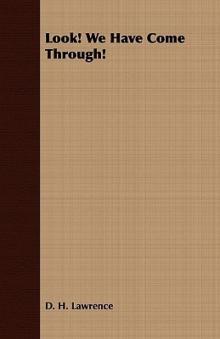 Look! We Have Come Through!
Look! We Have Come Through!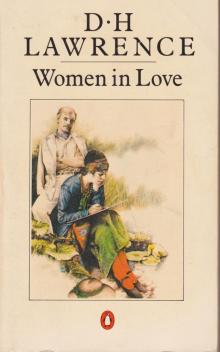 Women in Love
Women in Love The Ladybird
The Ladybird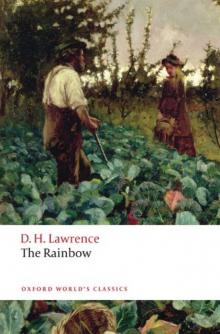 The Rainbow
The Rainbow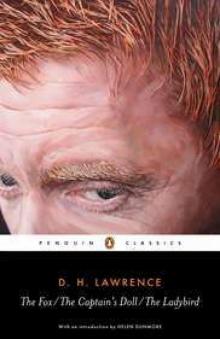 The Captain's Dol
The Captain's Dol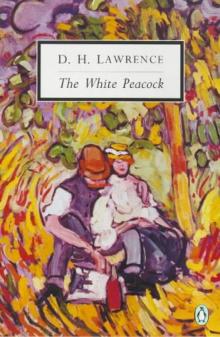 The White Peacock
The White Peacock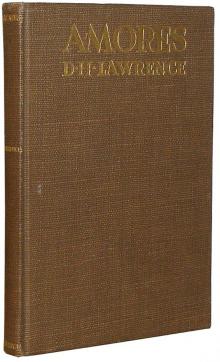 Amores
Amores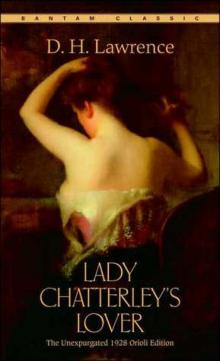 Lady Chatterley's Lover
Lady Chatterley's Lover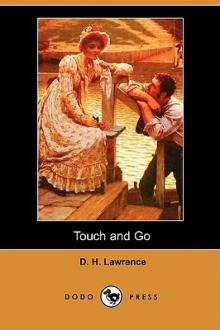 Touch and Go
Touch and Go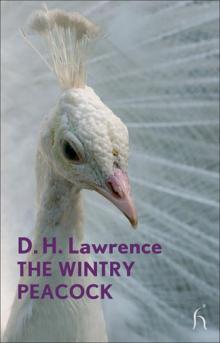 The Wintry Peacock
The Wintry Peacock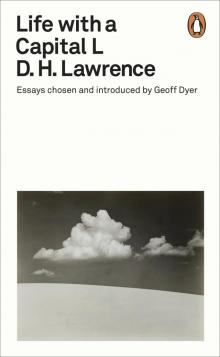 Life with a Capital L
Life with a Capital L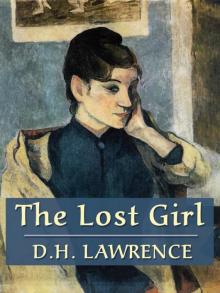 The Lost Girl
The Lost Girl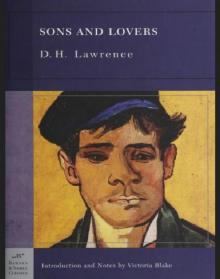 Sons and Lovers
Sons and Lovers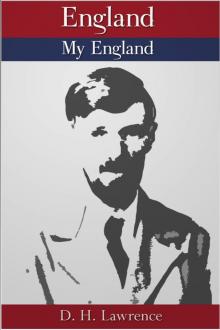 England, My England
England, My England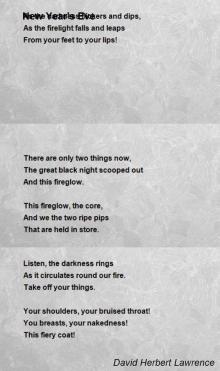 New Poems
New Poems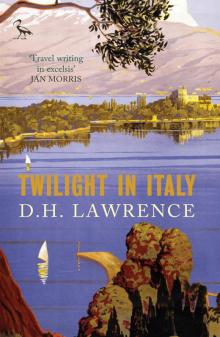 Twilight in Italy
Twilight in Italy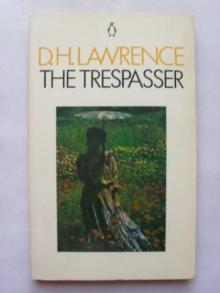 The Trespasser
The Trespasser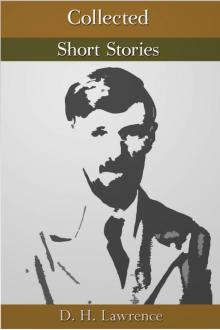 The Collected Short Stories
The Collected Short Stories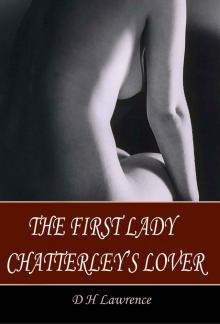 The First Lady Chatterley's Lover
The First Lady Chatterley's Lover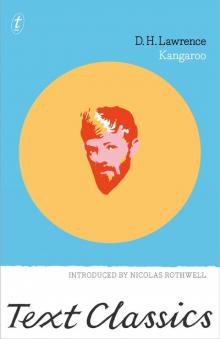 Kangaroo
Kangaroo Bay
Bay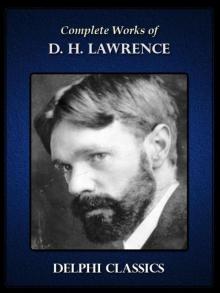 Complete Works of D.H. Lawrence
Complete Works of D.H. Lawrence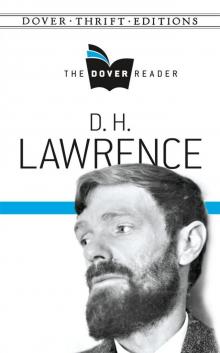 D H Lawrence- The Dover Reader
D H Lawrence- The Dover Reader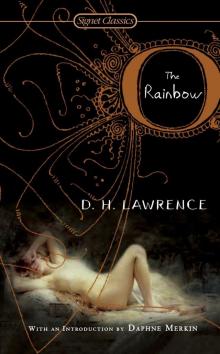 The Rainbow (100th Anniversary ed.)
The Rainbow (100th Anniversary ed.)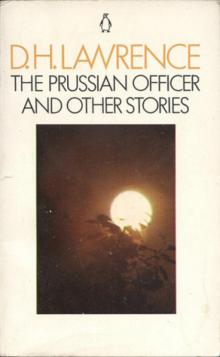 The Prussian Officer
The Prussian Officer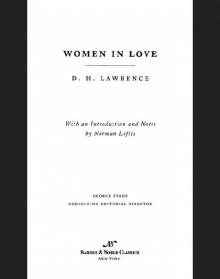 Women in Love (Barnes & Noble Classics Series)
Women in Love (Barnes & Noble Classics Series)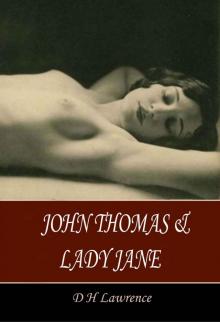 John Thomas and Lady Jane
John Thomas and Lady Jane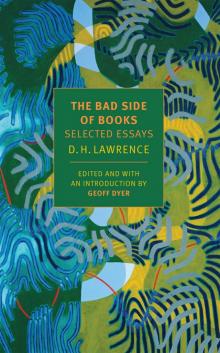 The Bad Side of Books
The Bad Side of Books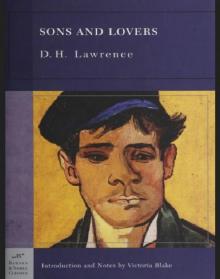 Sons and Lovers (Barnes & Noble Classics Series)
Sons and Lovers (Barnes & Noble Classics Series) Selected Stories
Selected Stories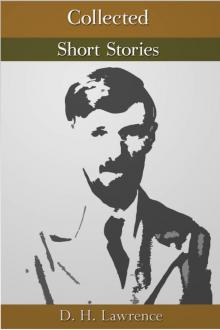 Collected Short Stories
Collected Short Stories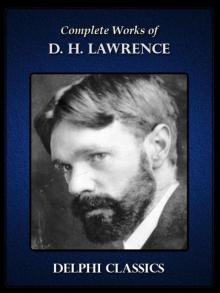 Complete Works of D.H. Lawrence (Illustrated)
Complete Works of D.H. Lawrence (Illustrated)